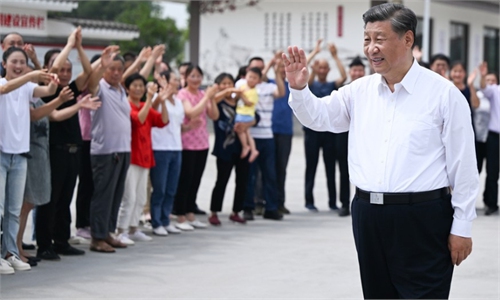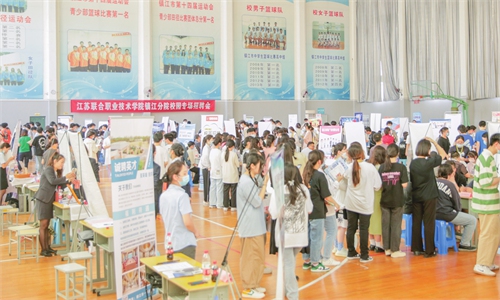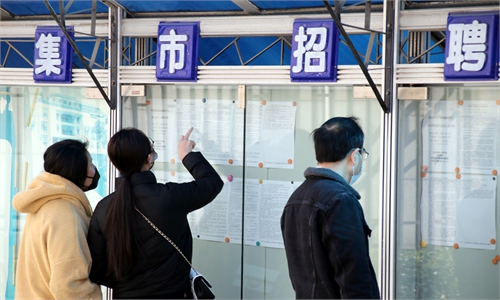IN-DEPTH / IN-DEPTH
More young people in China are seeking a career in rural areas and local communities, bringing with them knowledge, vitality
Dynamic career landscape

Chen Yichong (left), who returned to his hometown after graduating from college to start his own business, dries processed platycodon alongside local farmers in Zibo, East China's Shandong Province, on November 9, 2021. Photo: VCG
Editor's Note:
The number of college graduates in 2022 is expected to be 10.76 million, an increase of 1.67 million year-on-year, making a new record in both scale and growth. However, against the backdrop of the COVID-19 epidemic, graduates are likely to face challenges in the job market. It has been predicted that this summer could be the "hardest employment season."
At the same time, Chinese society has entered a new stage of development,with trends in employment also shifting. Staying in big cities, returning their homes, choosing to occupy grass-roots positions, starting their own businesses, or the evolution of new jobs, nowadays, Gen-Zers in China are presented with a wide range of innovative and diverse opportunities.
Therefore, the Global Times will publish a trilogy of stories about this "hardest employment season." In this first installment, we will focus on the young graduates who are seeking a career in rural villages or at local communities to devote themselves there with their knowledge and vitality.
More young people have flocked to less-developed regions in China to start their careers in villages or grass-roots communities in recent years, making them a new workforce in the rural revitalization process.
It is a decision made out of idealism and a willingness to make contributions in less-developed regions, as well as out of the undeniable reality of increasing pressure in employment caused by various factors such as the ongoing epidemic.
Luckily, the guidance and support provided by the government toward grass-roots employment have increased, and so has related learning in colleges and universities, which have allowed college graduates to better achieve their career and life goals in grass-roots positions.
Earlier this month, four government ministries, including the Ministry of Civil Affairs and the Ministry of Education, published a notice on the recruitment of college graduates working in rural and urban local communities, aiming to provide talent support to improve the level of precision of urban and rural community governance and services, and promote the modernization of grass-roots governance systems and capabilities.
State broadcaster CCTV quoted 2021 statistics stating that in the past three years, about 70 percent of college graduates across the country had gained employment in small cities and rural areas, and 60 percent of graduates chose to work in the central or western parts of China, which, compared to the country's eastern costal region, are not as developed economically.
Young people who have chosen to work in the grass roots have grown in their positions and found a sense of belonging and accomplishment.
'Go west'
After having working in a county court in Northwest China's Xinjiang Uygur Autonomous Region for less than a year, Guo Qinwei decided to stay in the grass-roots regions.
Guo, a graduate from the School of Law at the Southwest University of Political Science and Law in Southwest China's Chongqing, became a college graduate volunteer in 2021 with the "Go West" Program, which calls on young graduates to engage in voluntary services for up to three years, and corresponding subsidies are given by relevant authorities, after which they can choose to stay in the grass-roots communities with an official job or continue their studies in their respective universities.
After a short 10-day training stint, Guo was dispatched to the People's Court in Hejing county, in central Xinjiang, in August 2021.
"Sometimes, we had to work under tough conditions. For instance, we would have to cross deserts and grasslands," he said. "I have enjoyed it, and it gives me great satisfaction. This job allows me to have a deep understanding of how courts at the grass roots level solve legal problems and resolve social conflicts."
Born and raised in a small mountain village in Chongqing, Guo is among the college graduates who choose to stay at in the grass-roots communities in the pursuit and realization of their values in life. "Some of my schoolmates are also actively engaged in community affairs by working as village-level teachers, doctors, and technical instructors," he said.
Guo believes that as the younger generation is highly influenced by mass media, they can bring both great enthusiasm and innovation to the local communities. Making informative videos to increase awareness about the law on Kuaishou or Douyin -, two major streaming and short-video platforms in China - is just one such example of innovation.
Guo's current position earns him an average of 30,000 yuan ($4,500) a year. Compared with those working in big cities whose average salary is above 5,000 yuan per month, this is not a big sum. But Guo is content with it.
"It is a very honorable thing to work in the grass-roots communities, and as our government has done a lot in providing opportunities and resources in rural areas, we can 'make a big difference,'" Guo said.
"I enjoy the slow-paced yet comfortable way of life in the countryside, although I have had to give up something such as a higher salary and public transportation in the city," he said.
The central government has been encouraging college students to broaden their job searches and work in grass-roots communities, and venture to the central and western parts of China.
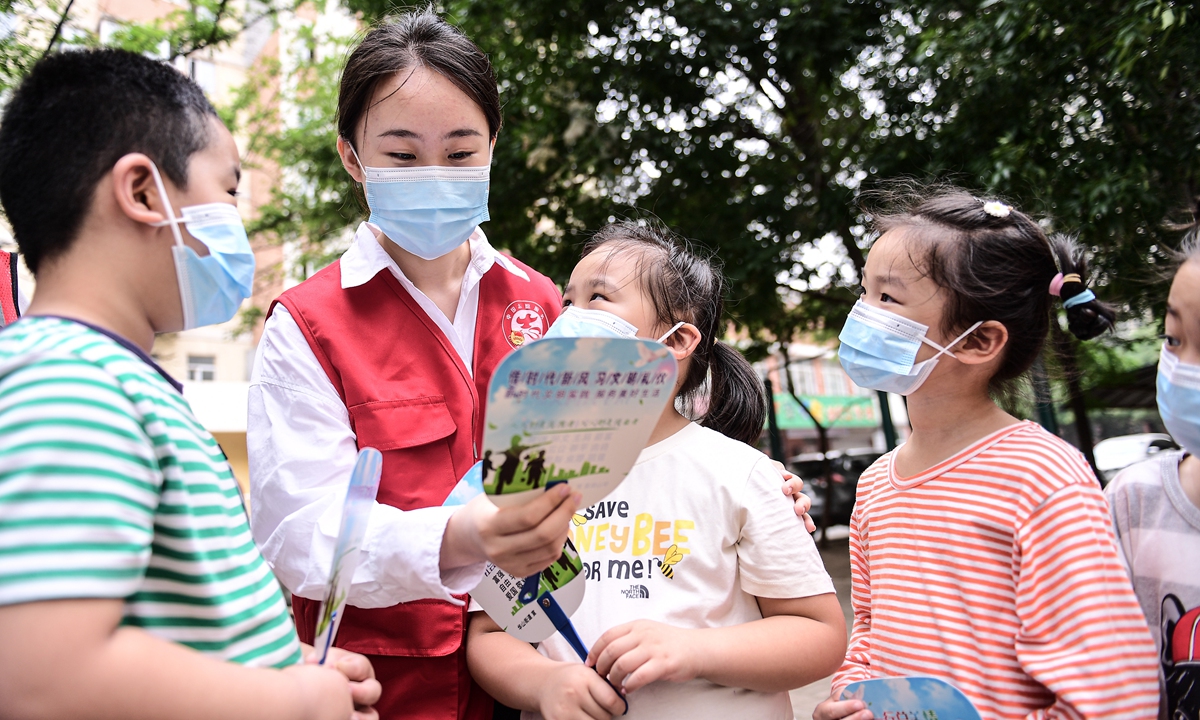
A university volunteer who actively responds to the school's call of "returning home" social practice activities interacts with children in a community in Shenyang, capital of Northeast China's Liaoning Province, on August 23, 2021. Photo: VCG
Over the past 18 years, through China's "Go West" Program, 410,000 postgraduates and college graduates have been dispatched to 2,100 counties in central and western regions to support poverty reduction endeavors there via teaching and healthcare services, according to statistics from the Central Committee of the Communist Youth League of China.He Wenhua, a senior student at the School of Chinese Language and Literature at Beijing Normal University, has also made up her mind to devote herself to education in rural areas.
"I was initially inspired by the story of Huang Wenxiu [a poverty alleviation grass-roots official in South China's Guangxi Zhuang Autonomous Region] who dedicated her life to the well-being of the poor and was a role model in our time," said He, who was born in a village in East China's Fujian Province.
"The impetus to my decision to return to my home village and serve as a 'cog' in the 'engine' of progress is that I myself was a left-behind student [whose parents made a living in big cities]. That's why I have decided to become a village teacher aftermy graduation," she said, "I also want to break the stereotype that people might think our generation is raised and attended to in the ivory towers."
In 2021, more than 270 Tsinghua University graduates went to work in grass-roots sectors in the country's western and northeastern regions, compared with around 220 five years ago.
According to the employment report released by Southeast University in East China's Jiangsu Province, in the past five years, the number of grass-roots recruits had increased by 203 percent. In 2017, 76 graduates from the university chose grass-roots employment, while in 2021 the figure increased to 231.China Agricultural University's 2021 graduate employment report noted that in 2021, a total of 291 people were selected for the national grass-roots employment project, and the number of selected people would achieve a "nine-fold consecutive increase."
A road less traveled
As young graduates like Guo and He are about to start their careers in rural areas, some of their forerunners have proven the possibility and feasibility of working in the grass-roots communities, which allows them a faster growth under tougher working environment.
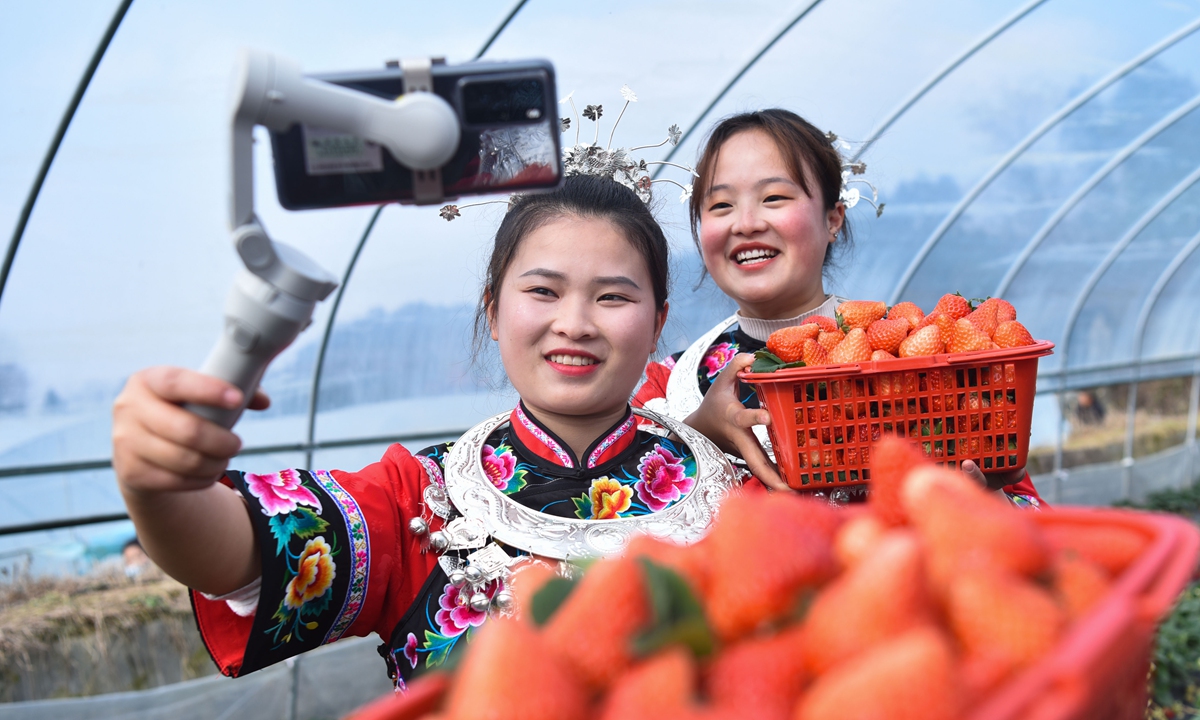
Two college students returning to their native village livestream a strawberry sale in Songtao Miao autonomous county, in Southwest China's Guizhou Province, on August 23, 2021. Photo: VCG
Gu Xin (pseudonym), 27, gave up a well-paid job in Kunming, capital of Southwest China's Yunnan Province, after his graduation and became a grass-roots civil servant in his hometown, a small city about 2 hours' drive from Kunming.Gu's career started amid a tough fight against COVID-19, as he was assigned to promote vaccination for senior citizens in a remote village in the town.
A rural life was not an easy fit at the beginning for Gu, who grew up in the city. Humble living conditions, communication barriers due to differences in local dialects, and doubts and concerns over COVID-19 vaccination expressed by senior citizens, all became challenges he had to overcome on a daily basis.
Gu and his team would often sleep for just about four hours every day during the vaccination campaigns. On many days and nights, Gu and his colleagues would bed down next to a thick stack of vaccination registers in their office-cum-bedroom.
After going door-to-door to count the unvaccinated, learning about everyone's concerns and persuading them to get the shot, Gu's village eventually took top ranking with the highest vaccination rates in town. Gu had also become a popular guest to many "left-behind elderly" in the village.
The decision to stay and work in his hometown after graduation was mainly inspired by his parents, Gu told the Global Times.
Gu's parents were college graduates who moved to a city inYunnan from Southwest China's Sichuan Province in the 1980s and settlted down to work in agricultural research.
"I have occasionally envied those students who work and enjoy themselves in megacities, but when I see how such grass-roots efforts have helped improve the lives of my rural residents, I know that it is a worthy source of my sense of accomplishment," he said.
"Seeing one more new road constructed in a remote village, or seeing villagers learning to increase their income through an e-commerce platform, all by our efforts, is totally worthwhile," said Gu, who called for more enthusiasm and youthful innovation to be injected into the villages.
The dynamic balance
Many of China's Gen-Zers enjoy bright prospects and have benefited from the rapid development of the country, the achievements of poverty alleviation in rural areas, and the efforts made to meet rural revitalization targets.
"Compared to the older generations who went to villages surrounded by deep mountains to make a living, these graduate students born around the millennium are driven by voluntary consensus that by working in the rural areas, they can fulfill their sense of social responsibility and temper themselves in the course of participating in the grass-roots work," said Zeng Weiwei, a counselor at the Southwest University of Political Science and Law.
By working in rural areas in posts related to teaching, agriculture, healthcare, and poverty alleviation, young people have turned their pursuit of the Chinese Dream into pragmatic work, and are honing their skills and increasing their abilities through experimentation and exploration, Zeng noted.
Xiong Bingqi, deputy director of the Shanghai-based 21st Century Education Research Institute, said that college graduates flocking to the grass-roots communities for employment is a two-way selection.
Most job posts in the cities are fully occupied by the most excellent students, and in search of alternatives, some have to choose places such as small villages or less-developed regions, which could resolve local talent shortages, Xiong noted.
The term "involution" or neijuan is an accurate description of the phenomenon where many young students desperately pursue higher education so as to become more competitive in the job market.
The record high number of 10.76 million college graduates this year alone is a vivid example of the 'involuted' generation, who believe the higher education they attain, the higher the payment they can get from a decent job, said Xiong.
Xiong noted that under the current trend, colleges and universities should work to improve their students' abilities so that the graduates can become more competitive in their careers.
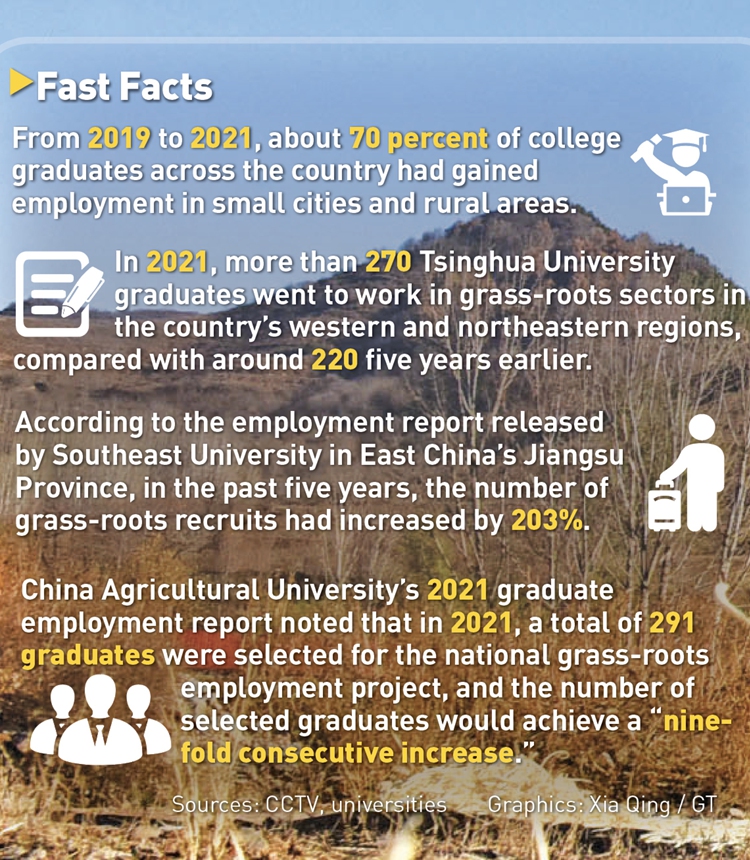
Graphic:GT

